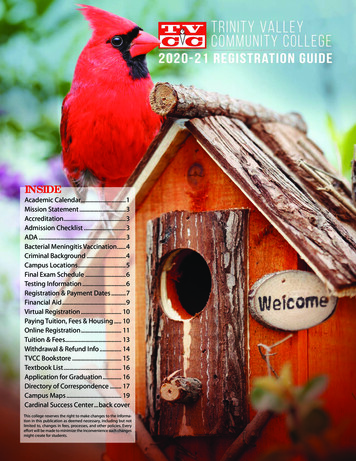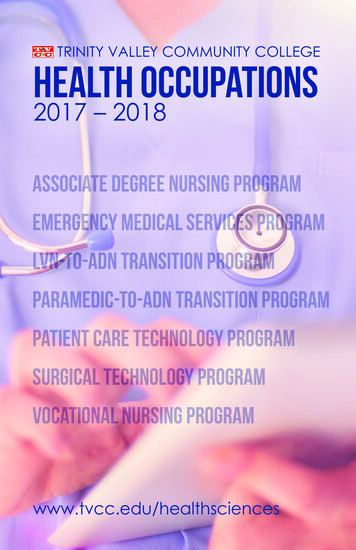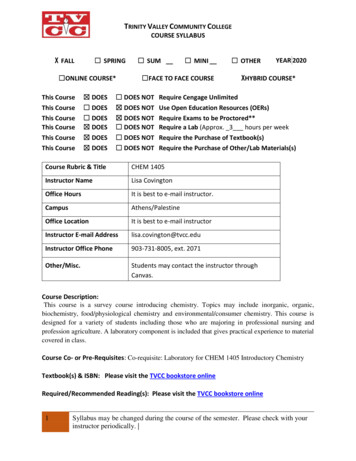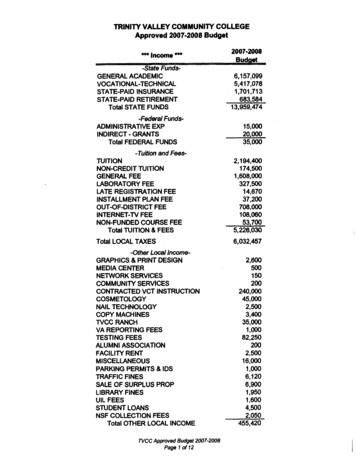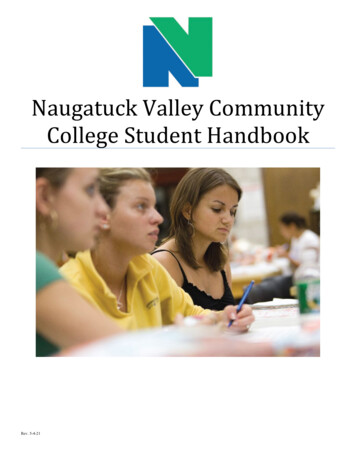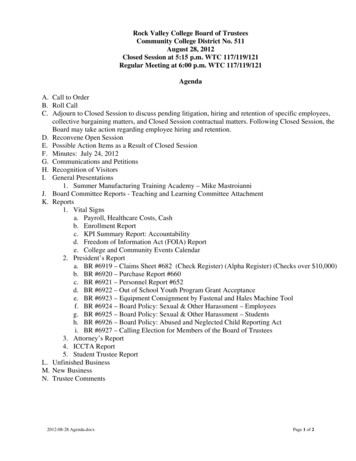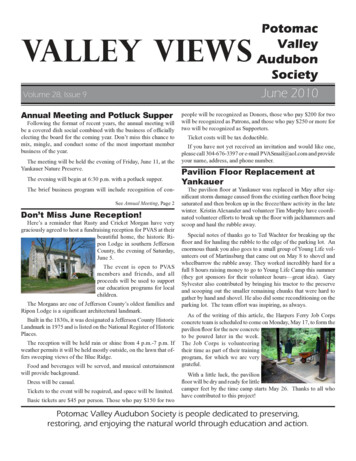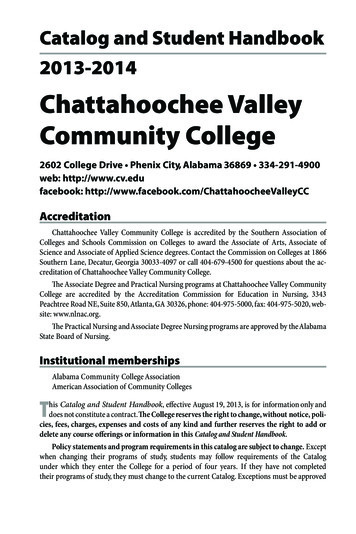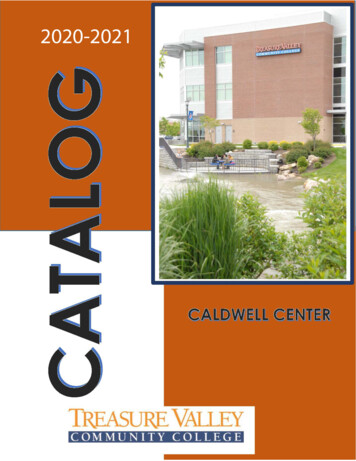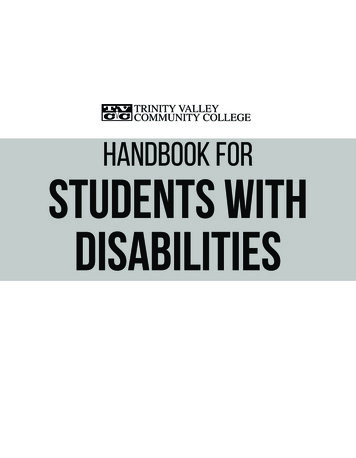
Transcription
TRINITY VALLEYCOMMUNITY COLLEGEHANDBOOK FORSTUDENTS WITHDISABILITIES
ACCREDITATIONTVCC is accredited by the SACSCOC to award associate degrees and certificates. Contact the SACSCOC at 1866Southern Lane, Decatur, Georgia 30033-4097, telephone 404-679-4500, at http://www.sacscoc.org for questions aboutthe accreditation of TVCC. The SACSCOC is to be contacted only if there is evidence that appears to support theCollege’s significant non-compliance with a requirement or standard. All other inquiries about TVCC, such as admissionrequirements, financial aid, educational programs, etc., should be directed to the College at 100 Cardinal Drive, Athens,Texas 75751 or by calling 903-675-6200. TVCC received initial accreditation to award associate degrees from theSACSCOC in 1952, and received its last reaffirmation of accreditation in 2007 with no sanctions or negative actions.The Department of Education (DOE) recognizes the Accreditation Commission for Education in Nursingfor TVCC’s Associate Degree Nursing Program that received its last reaffirmation of accreditation in 2009with no sanctions or negative actions.APPROVALPrograms and courses offered by Trinity Valley Community College are approved by theTexas Higher Education Coordinating Board.TVCC MISSION STATEMENTTrinity Valley Community College is a learning-centered college that provides quality academic, workforce, college preparatory, student support, and community service programs that prepare and empower students for success and promote andenhance life-long learning for all communities served.THE COLLEGE WITH OPPORTUNITIESTVCC is an equal opportunity institution which provides educational and employment opportunities on thebasis of merit and without discrimination because of race, color, religion, sex, age, national origin or disability.Questions or problems related to Title IX and Section 504 compliance activities should be directed to theDriector of Human Resources, 100 Cardinal Drive, Athens TX 75751 (903) 675-6215.
PHILOSOPHY/OBJECTIVETrinity Valley Community College welcomes the student with academic potential who has a special need as a part of thestudent body. This institution is committed to assisting qualified students as completely as possible within the Collegecommunity. Trinity Valley Community College provides equal opportunities for academically qualified students with disabilities and ensures access to a wide variety of resources and programs. The passage of Section 504, Federal RehabilitationAct of 1973, and the “Americans with Disabilities Act” of 1990 requires that the College make certain special arrangementsfor students with disabilities, such as moving classes to accessible locations when necessary, allowing use of tape recorders,sign language interpreters or other educational auxiliary aids, making special test arrangements, etc. This does not meanthat less should be required of the student with a disability than of others, but only that reasonable accommodations shouldbe made to ensure that students with a disability have access to an education. The College will make reasonable accommodations for qualified students with a diagnosed physical and/or learning disability who have been admitted to the Collegeand request accommodations.Trinity Valley Community College Student Success Services serve as liaison for students with disabilities. The programprovides reasonable accommodations and assistance to the academically qualified student who has a physical/learningdisability which substantially limits one or more of his/her life activities. All students are expected to abide by the StudentCode of Conduct as outlined in the Student Handbook. Accommodations are decided based upon documentation andneed on a case-by-case basis.The following list of services may be available when appropriate: Classroom notetakersPeer, professional and computer tutoringStudy skills trainingInterpretersReaders/scribesMedia aidsHandicapped parkingSpecial arrangements for taking tests (prior notice is necessary)Specialized and modified equipmentWheelchair accessPre-admission guidance and assistance with registrationSpecialized counselingCareer planningLiaison and advocacy to faculty, staff, and administrationReferral for diagnostic evaluation and community resourcesOther services are available on an individual basisSupport Agencies: Department of Assistive and Rehabilitative Services Texas Commission for the Blind
THE LAW: SECTION 504WHAT IS THE LAW?Secion 504 of the Rehabilitation Act of 1973 states:“No otherwise qualified individual in the United State.shall, solely by reason of.handicap, be excludedfrom participation in, be denied the benefits of, or be subjected to discrimination under any program oractivity receiving federal financial assistance.”WHO IS PROTECTED UNDER THE LAW?A “handicapped person” means “any person who (i) has a physical or mental impairment which substantially limits oneor more of such person’s major life activities; (ii) has a record of such an impairment, or (iii) is regarded as having such animpairment.”A “qualified handicapped person” is defined as one who meets the requisite academic and technical standards required foradmission or participation in the postsecondary institution’s programs and activities. Section 504 protects the civil rightsof individuals who are qualified to participate and who have disabilities such as, but not limited to, the following: Blindness or visual impairmentsCerebral palsyChronic illnesses, such as:AIDSArthritisCancerCardiac diseasesDiabetesMultiple sclerosisMuscular dystrophyPsychiatric disordersDeafness or hard of hearingDrug or alcohol addiction (Section 504 covers former users and those in recovery programs and not currently using drugs or alcohol.”)Epilepsy or seizure disordersMental retardationOrthopedic handicapSpecific learning disabilitiesSpeech disorderSpinal cord or traumatic brain injury
AMERICANS WITH DISABILITIES ACTWhat is the ADA?The Americans with Disabilities Act of 1990 (ADA) is the civil rights guarantee for persons with disabilities in the UnitedStates. It provides protection from discrimination for individuals on the basis of disability. The ADA extends civil rightsprotection for people with disabilities to employment in the private sector, transportation, public accommodations, services provided by state and local government, and telecommunication relay services. The significance of this legislation isno less than that of the civil rights acts in the 1960’s for minorities.Who should request accommodations?A person that should request accommodations would be anyone with a physical or mental impairment (or who has a history of such a condition, or who is perceived by others to be disabled) that substantially impairs or restricts one or moremajor life activities, such as caring for one’s self, performing manual tasks, walking, seeing, hearing, speaking, breathing,learning and working. The term physical or mental impairment includes, but is not limited to: SpeechHearingVisual and mobility impairmentsCerebral palsyEpilepsyMuscular dystrophyCancerDiabetesHeart DiseaseAIDSMental retardationEmotional illnessSpecific learning disabilities such as perceptual handicaps, brain injury, dyslexia, minimal brain dysfunction anddevelopmental aphasia.Does the ADA Affect Students at Postsecondary Institutions?Postsecondary institutions that receive federal monies have been required to comply with a similar disability nondiscrimination law -- Section 504 of the Rehabilitation Act of 1973. The ADA upholds and extends the standards for complianceset forth in Section 504 to employment and promotion practices, the planning of meetings, and communications.
INDIVIDUALS WITH DISABILITIES EDUCATION ACTIDEA (Individuals with Disabilities Education Act) and Section 504 of the Rehabilitation Act of 1973 are very different,leading to miscommunication between college and high school staff who have studied only the statutes applying to theirinstitution. For example, in high school, a student classified as learning disabled in a specific area (i.e., reading comprehension), may also receive special services in another area (i.e., math). In college, a student is only eligible to receive accommodations that are directly associated with the specific identified disability. In other words, accommodations listed inindividual education plans (IEPs) developed at a high school are not binding on a college or university.DIFFERENCES BETWEEN HIGH SCHOOL AND COLLEGE High SchoolIndividuals with Disabilities Education ActSection 504 of Rehabilitation Act of 1973Americans with Disabilities ActCivil Rights Restoration ActResponsibilities of High SchoolsIdentify students with disabilitiesProvide assessment of learning disabilitiesClassify disabilities according to specified diagnostic categoriesInvolve parents or guardians in placement decisionsProvide certain nonacademic servicesPlace students in programs where they can benefit(in any way) by placement committee with parentparticipation and approvalStructure a large part of the student’s weekly scheduleModify educational programsPrepare Individualized Educational Plans (IEPs)Provide a free and appropriate educationProvide appropriate services by school nurse orhealth service CollegeSection 504 of Rehabilitation Act of 1973Americans with Disabilities ActCivil Rights Restoration ActResponsibilities of CollegesProtect a student’s right to privacy and confidentialityProvide access to programs and servicesInform students of office location and proceduresfor requesting accommodationsAccept and evaluate verifying documentationDetermine (via documentation) that an impairment causes a substantial limitation on a major lifeactivityDetermine for students who are otherwise qualifiedfor participation in the program or service whethera reasonable accommodation is possibleMake reasonable accommodations for studentswho meet the above criteriaProvide reasonable access to program and servicechoices equal to those available to general publicSuggest reasonable adjustments in teaching methods that do not alter the essential content of acourse or programAssure that off-campus and contracted programfacilities also comply with Section 504 (Subpart E)and ADAInform students of their rights and responsibilitiesColleges are not required to: Reduce or waive any of the essential requirements of a course or program ; conduct testingand assessment of learning, psychological, or medical disabilities; provide personal attendants; provide personal or privatetutors (but tutoring services normally available to persons without disabilities must be accessible to persons with disabilities who are otherwise qualified for those services); or prepare “Individual Education Plans” (IEPs)
ACADEMIC SUPPORT SERVICESFor information about accommodations and services for students with disabilities at the branch campuses of TVCC, pleasecontact:TVCC – Palestine2970 North State Hwy. 19P.O. Box 2530Palestine, TX 75802(903) 729-0256Health Science Center800 Ed Hall DriveKaufman, TX 75142(972)932-4309TVCC – Athens100 Cardinal DriveAthens, TX 75751(903) 675-6224Baugh Technology Center, CSC - TC 311Melinda Berry, Director Student Success ServicesTVCC – Terrell1200 East I-20PO Box 668Terrell, TX 75160Pre-Admissions GuidanceProspective students with disabilities are encouraged to arrange a visit to the campus prior to admission in order to becomeacquainted with the facilities and services offered by Trinity Valley Community College which will enable them to fullyparticipate in regular classroom instruction.The College will make reasonable accommodations for qualified students with a diagnosed physical and/or learning disability who apply for admission. It is the responsibility of the student to be aware of the guidelines, procedures and policiesoutlined in the official College Catalog and Student Handbook. This Handbook for Students Requesting Accommodationsis mainly to inform the student of procedures on applying for accommodations through Trinity Valley Community College.Assistance with Registration ProcessThe student should make Student Success Services aware of his/her needs and request the assistance needed. Notificationbefore the beginning of any semester is necessary for adequate scheduling of services. Any type of reasonable accommodation or assistance to increase the opportunity for success will be provided, if at all possible.If a reasonable accommodation in the registration procedure or instructional environment is requested, the student mustobtain a Request for Accommodation Form (RAF) from Student Success Services and have an interview with a counselor.Current medical and/or psychological documentation which verifies their disability will be required with the RAF.The deadline for applying for assistance with Student Success Services is normally four weeks prior to the beginning of theinitial semester of enrollment, in order to allow time to provide adequate coordination of services. The deadline for applying for subsequent continuous semesters of enrollment is two weeks prior to the beginning of regular college registration for that semester.Liaison and Advocacy to Faculty, Staff and AdministrationStudents with disabilities may request that instructor/staff be informed of accommodations which may be provided in theclassroom or to assist classroom instruction. A confidential form, The Faculty and Staff Advisement Form will be prepared,and the student will be able to take the form to his/her instructor/staff during the first week of classes.A Request for Accommodations Form must be completed prior to the beginning of each semester in the Disability Office ifaccommodations are needed due to a physical or learning disability.Appropriate documentation of physical or psycho/educational evaluation or Rehabilitation Agency referral must be submitted before any accommodations can be arranged. This evaluation and/or referral must clearly document the disability
and support the need for accommodations. Reasonable accommodation requests and documentation may be subject toreview by the ADA Compliance Committee.The deadline for applying for assistance with the Disability Office is normally four weeks prior to the beginning of the initial semester of enrollment, to allow time to provide adequate coordination of services.The deadline for applying for subsequent continuous semesters of enrollment is two weeks prior to the beginning of regularcollege registration for that fall or spring semester.Disability Documentation GuidelinesBefore special accommodations can be offered, the student requesting such accommodations must provide appropriatedocumentation that such services are required because of a disability that substantially limits some life activity. TVCCreserves the right to determine eligibility and appropriate services based on the quality, recentness, and completeness of thedocumentation submitted. A diagnosis of a disorder/condition/syndrome in and of itself does not automatically qualifyan individual for accommodations under the ADA. The documentation must support the request for accommodations,academic adjustments, and/or auxiliary aids.All documentation is considered as confidential and will not be shared without the student’s written permission. TVCCdoes not provide testing for disabilities. Testing evaluations and other documentation should have been administeredwithin the past three (3) years to be considered current. Documentation older than five (5) years is generally consideredto be out-dated. Students that submit documentation that is not current or is inadequate may be required to have updatedtesting completed before accommodations will be granted.In general, all documentation must be completed by an appropriate professional and contain: A diagnosis of current disability. The date of the diagnosis. How the diagnosis was reached (names of evaluation instruments and criteria, if appropriate to diagnosis). How the disability affects a major life activity. Functional limitations due to the disability and the level of severityof the disability. The areas of educational impact. Prescriptive treatments and/or medications and the impact on the disability. The credentials of the diagnostician. Specific suggestions for reasonable accommodations appropriate to the postsecondary education level. Recommended academic accommodations.The following are some elements that are required in documentation in order to recommend reasonable classroom accommodations:Learning Disabilities Qualified professional must conduct the evaluation (i.e., school psychologists, neuropsychologists, learning disabilities specialists, medical doctors, LPC). Evaluation must be comprehensive and substantiate the Learning Disability and/or specific diagnosis. Actual test scores from standardized instruments must be provided. An interpretive summary must be provided. Must include recommendations for reasonable academic accommodations appropriate to postsecondary education. All reports should be on letterhead, typed, dated, signed, and legible. If the data available to the evaluator shows that a learning disability is not present, the report should specificallystate so.A school plan such as an Individual Education Plan or a Section 504 Plan is not sufficient documentation by itself, but itcan provide some valuable information. Some of the important information which should be contained includes an IQscore, an assessment of academic achievement and information processing, and relevant test scores. DARS records orrecords from other appropriate agencies or medical institutions can be informative also.
ADD/ADHD Evaluation must be conducted by a qualified professional (Psychologist, Medical Doctor, Psychiatrist, LPC, Diagnostician).Documentation must indicate that ADD/ADHD substantially limits some major life activity, including learning.Evaluation must be comprehensive and substantiate ADD/ADHD. The evaluation should include evidence of earlyimpairment; evidence of current impact, diagnostic interview, and all other alternative diagnoses or explanationsneed to be ruled out.Relevant testing information must be provided. Neuropsychological and psychoeducational assessments areimportant in determining the current impact of the disorder on the individual’s ability to function in academic settings Checklists and/or surveys can serve as supplements to the diagnostic profile but in and of themselves are notadequate for the diagnosis of ADD/ADHD. In addition, the report should indicate the degree to which the problem has been impacted by medication. If the condition is medically controlled, the report should specifically statethat it is controlled.A specific diagnosis utilizing DSM-IV criteria.An interpretive summary should be provided.Deaf or Hard of HearingAcceptable documentation of a hearing impairment should be completed by a medical specialist or an audiologist andshould state specifically the degree of hearing loss or impairment, along with recommendations for the most appropriatepostsecondary academic accommodations. A certificate of deafness from DARS is also acceptable.Blind or Visually ImpairedDocumentation of blindness or visual impairment should be done by a medical specialist (ophthalmologist). A statementfrom the Texas Commission for the Blind is also acceptable.Mobility ImpairmentDocumentation should be a current medical evaluation completed by a medical specialist (orthopedist, physical therapist,neurologist). Records from DARS should also be included.Traumatic Brain InjuryDocumentation should be completed by a neurologist or neuropsychologist and include recommendations for appropriatereasonable accommodations in a postsecondary academic setting.Psychological DisordersDocumentation should be a comprehensive and current psychological/psychiatric evaluation
The Department of Education (DOE) recognizes the Accreditation Commission for Education in Nursing for TVCC’s Associate Degree Nursing Program that received its last reaffirmation of accreditation in 2009 with no sanctions or negative actions. APPROVAL Programs and courses offered by Trin
